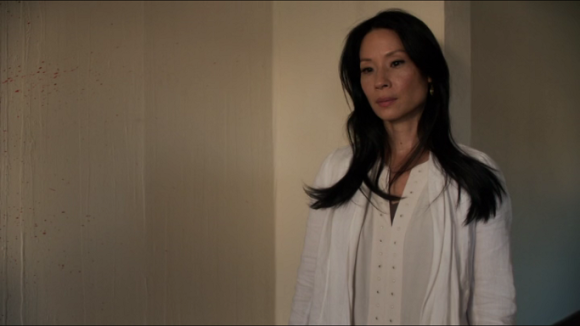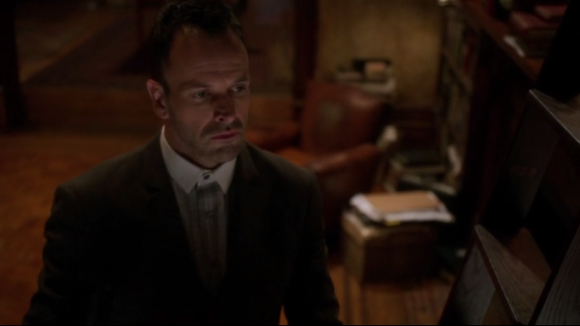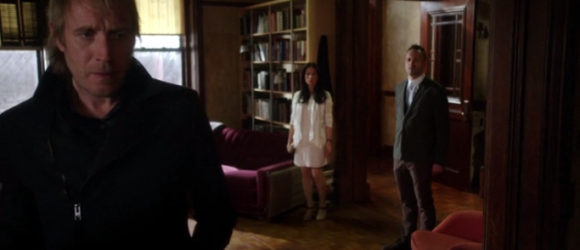Review: Season 2 of Elementary!
Review

This review contains spoilers for all of season two of CBS’s Elementary.
Even as a fan of the show, I was not actually expecting the second season of Elementary and its finale to match what it had pulled off in Season 1—namely, because Natalie Dormer is now busy with Game of Thrones and really, Lucy Liu versus Natalie Dormer in a battle of hardcore ladies matching wits with millions of dollars, a global crime syndicate, and one man’s life in the balance? How were they going to top that? The writers still tried, bless their hearts.
Which is why, even a week after the finale, I find myself confused at how they managed to underwhelm me even when I was expecting to be underwhelmed.
This season had some very strong episodes. Elementary is, in many ways, a police procedural with Sherlockian elements instead of the other way around, which is perhaps why so many fans of Sir Doyle’s detective have been tentative to give Elementary a try. Despite the occasional formulaic form of such a show, there were a number of cases this season that had me intrigued even as a long-time fan of the genre. “Solve for X,” “Corpse de Ballet,” and “The Many Mouths of Andrew Colville,” stand out for their interesting premises, while “Tremors,” “The Diabolical Kind,” and “No Lack of Void” excel by using the cases as a framework to bring out the emotional conflict in and between characters. The fact that the anonymous internet hacktivist collective Everyone wasn’t introduced in the early season only to be discarded as a single-episode plot device, and instead showed up several times in later episodes, was also gratifying on a world-building level, as was the return of the NSA into Joan and Sherlock’s affairs.
Of course, the cases are why you watch a single episode: the characters are why you watch an entire season. While Sherlock’s character arc on his struggles with forging worthwhile human connection has ping-ponged back and forth over the season — his complicated relationship with Mycroft, his responsibility in Bell’s injury and antagonizing of the department’s other police, Moriarty’s letters, etc. — Watson’s own growth and search for independence outside of her partnership with Sherlock has been… there, and there consistently, but rarely in focus. The realization of how much of Joan’s life now revolves around their Great Work was brought up early in episode four but, aside from a few ominous conversations (notably with Jamie and Lestrade) about what it will be like once Sherlock has moved on from their friendship, which Watson even rebuffs, Watson’s development from loyal partner to separate entity doesn’t get much attention. That is, until she starts hooking up with Mycroft again near the finale; then it’s full speed ahead to wanting her own apartment so that she can see less of one Holmes brother and more of the other.

To be fair, as always, Watson is a character who is very big on boundaries. This is one of her greatest strengths as a character. It makes sense that she would want space from Sherlock and to explore other areas of her life besides just crime solving. She’s a considerably more social creature than Sherlock and her desire for more people and more relationships in her life has been shown more than a few times over the show’s full run. Considering this, the choice to stage Joan’s decision to move out in the context of her growing relationship with Mycroft, even if it’s stated outright to not be the only cause, feels a bit hollow. If more attention to her growing desire for space had been paid attention to during the lead up to the finale, we could have seen her coming to that decision separately from her relationship with Mycroft, instead of being told about it while they were on a date discussing how them getting together would affect Sherlock.
As a result I really wasn’t sad to hear Mycroft is going into WitSec due to the finale’s fallout. Okay, thanks, don’t feel pressured to write. I’m glad Sherlock and Joan could clear you of treason charges, but I’m not devastated to see you go. I also didn’t care much about Sherlock’s decision to work for M16, except that I was glad he didn’t let Joan’s decision to move out send him into relapse (both for his own sake and for Joan’s).

It’s still a fantastic show and the equitable partnership of respect that Joan and Sherlock share is something so worth watching that I still will recommend it to undecided Doyle fans, but I hope Joan’s personal growth is brought a little more to the forefront in season three. I’m looking forward to seeing the sort of cases Sherlock now gets at MI6, as well as how the new environment affects his relationships with Joan, the NYPD, and his continued sobriety. And if Natalie Dormer (or a new regular female character) is preset? Even better.
What did you think about Season 2 of Elementary? Did you feel the finale was a good capstone? Is there anything you’re hoping to see when Elementary comes back in October?
Alana Mancuso is a writer, editor, and TV junkie with a passion for sharing and supporting beginning artists and writers. You can chat with her on Twitter @AlanaMancuso or find out more about her work at alanamancuso.com
Have a tip we should know? [email protected]
